人教新目标(Go for it)版七年级下Unit 4 Don't eat in class. Section A课件(30张ppt)
文档属性
| 名称 | 人教新目标(Go for it)版七年级下Unit 4 Don't eat in class. Section A课件(30张ppt) |  | |
| 格式 | ppt | ||
| 文件大小 | 941.0KB | ||
| 资源类型 | 教案 | ||
| 版本资源 | 人教新目标(Go for it)版 | ||
| 科目 | 英语 | ||
| 更新时间 | 2022-03-21 15:49:47 | ||
图片预览

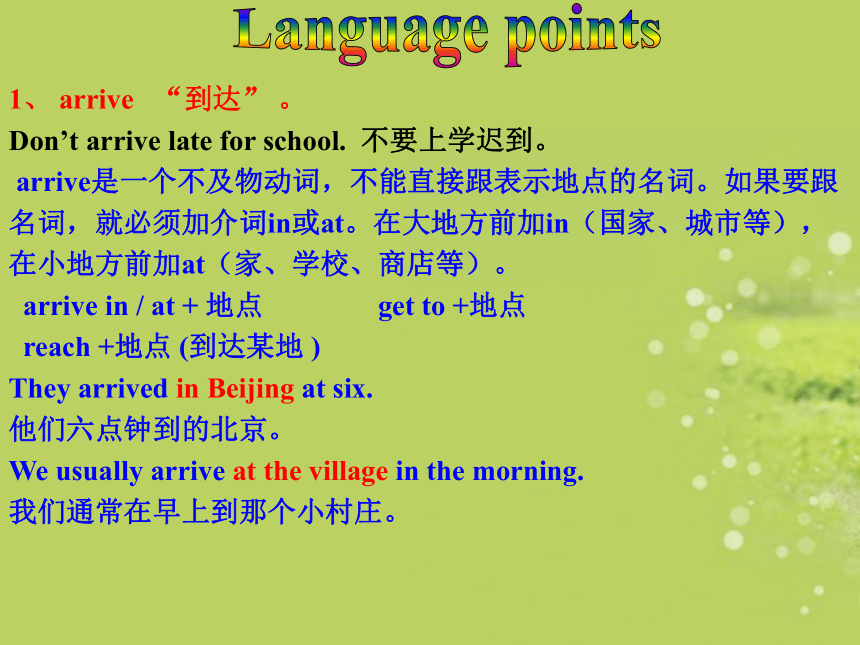
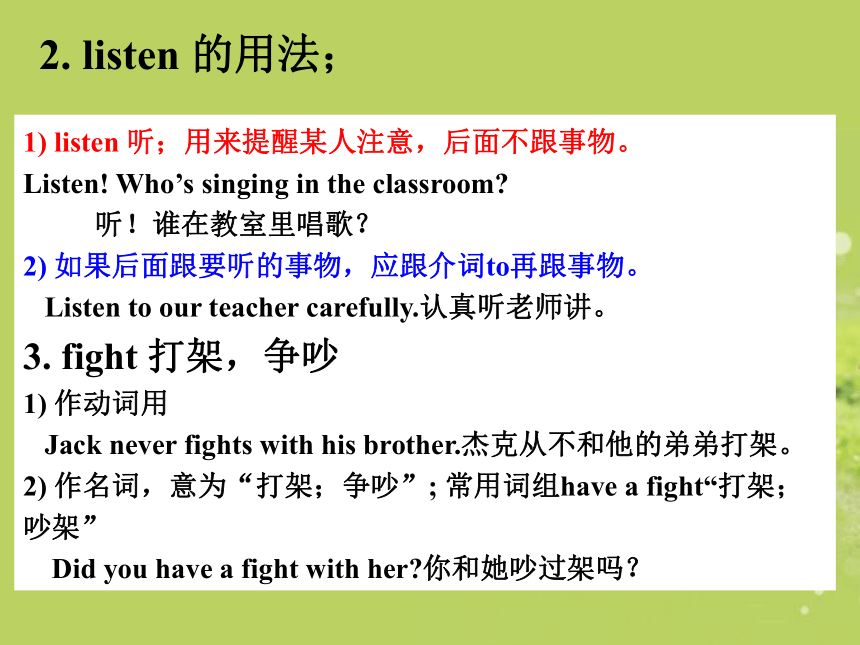
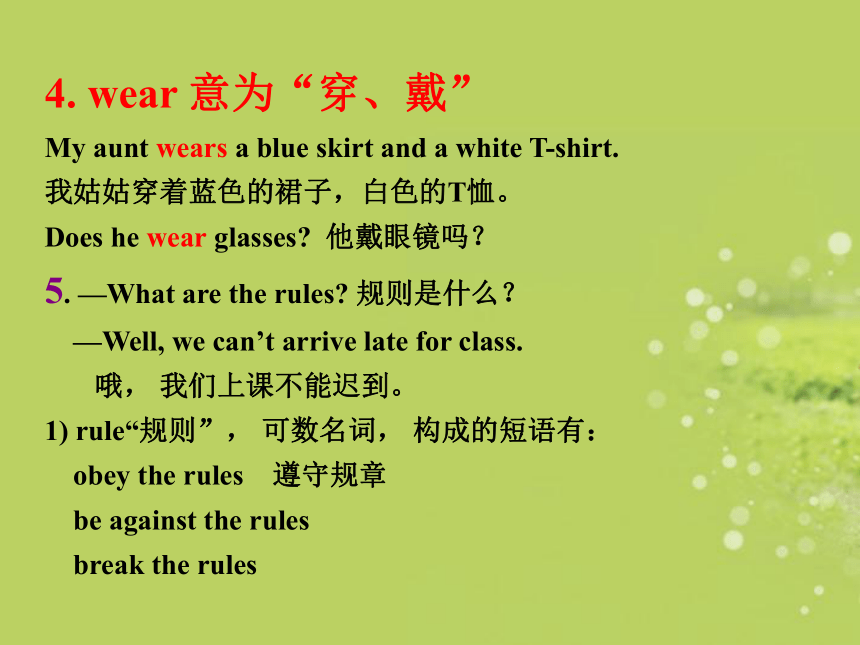
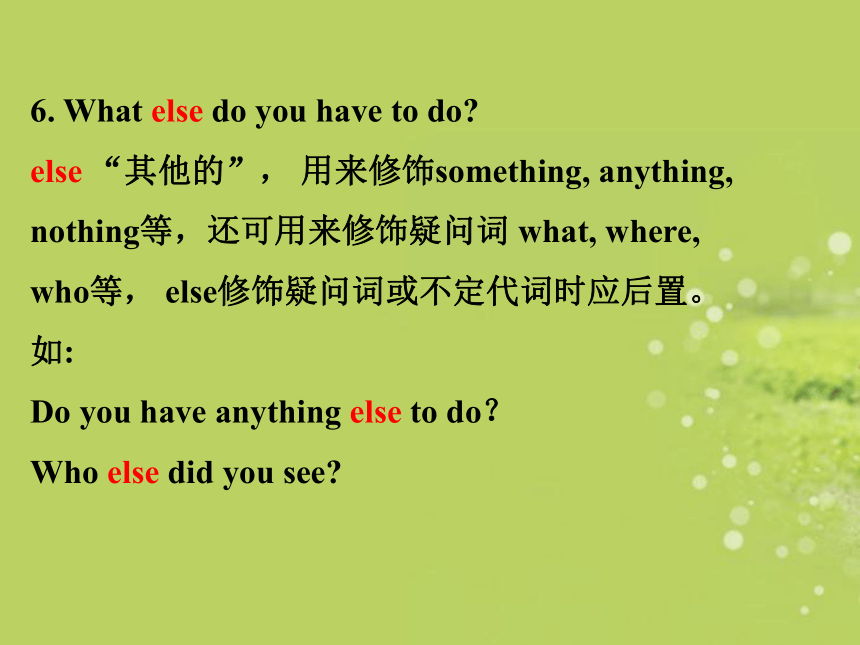
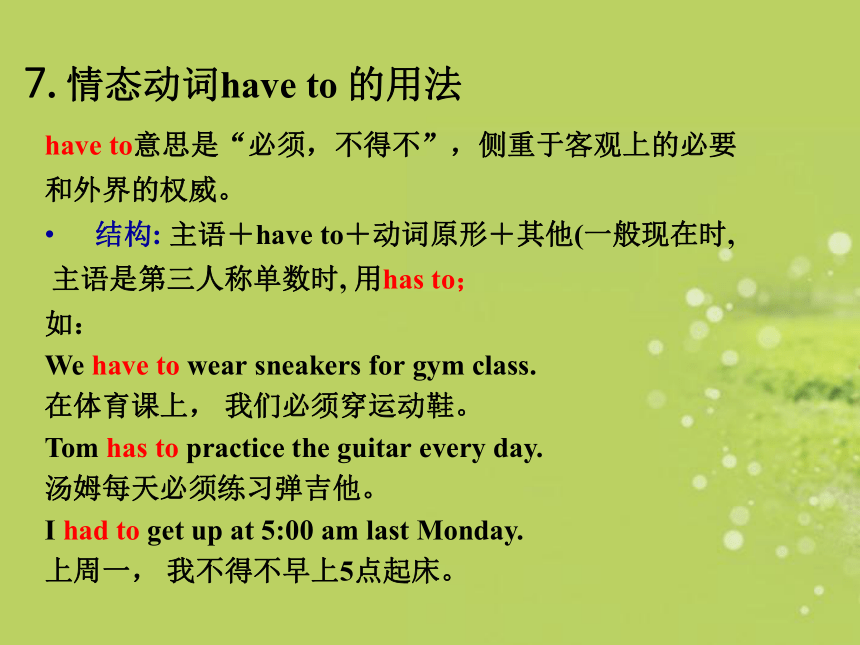
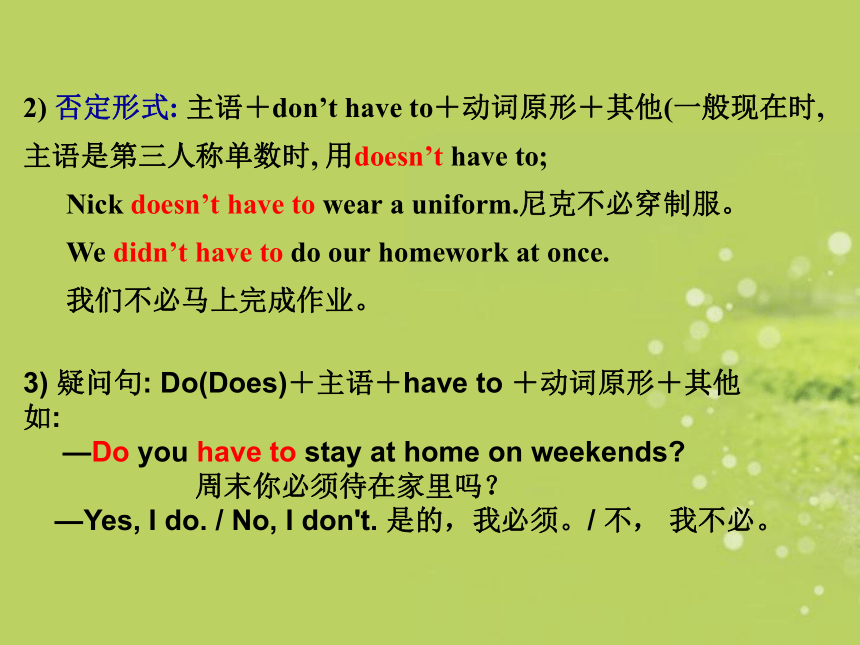
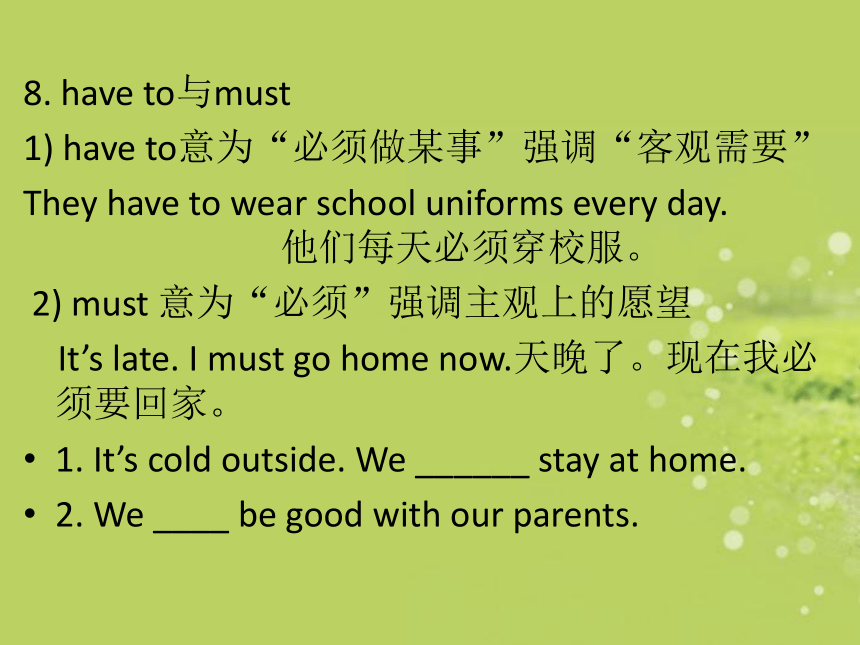
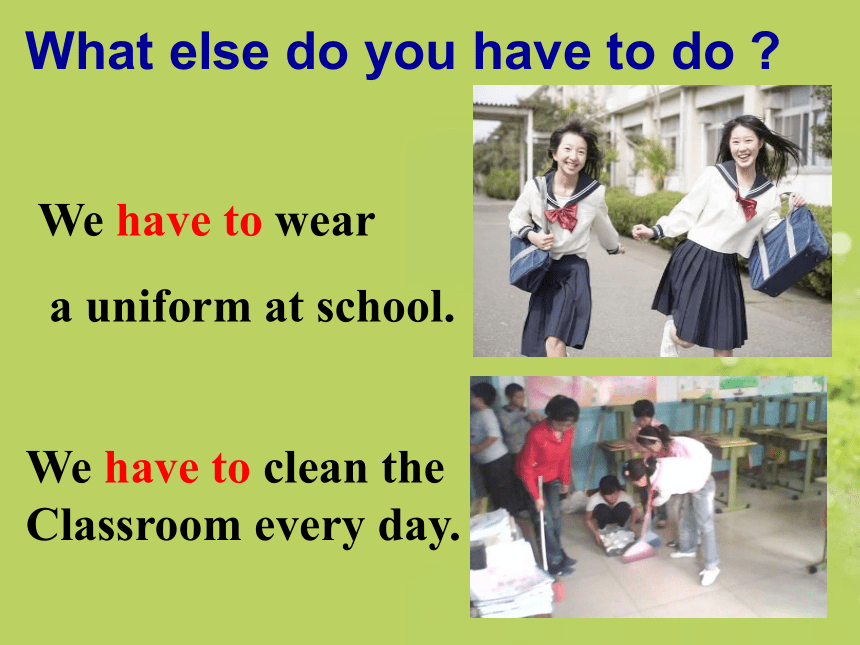

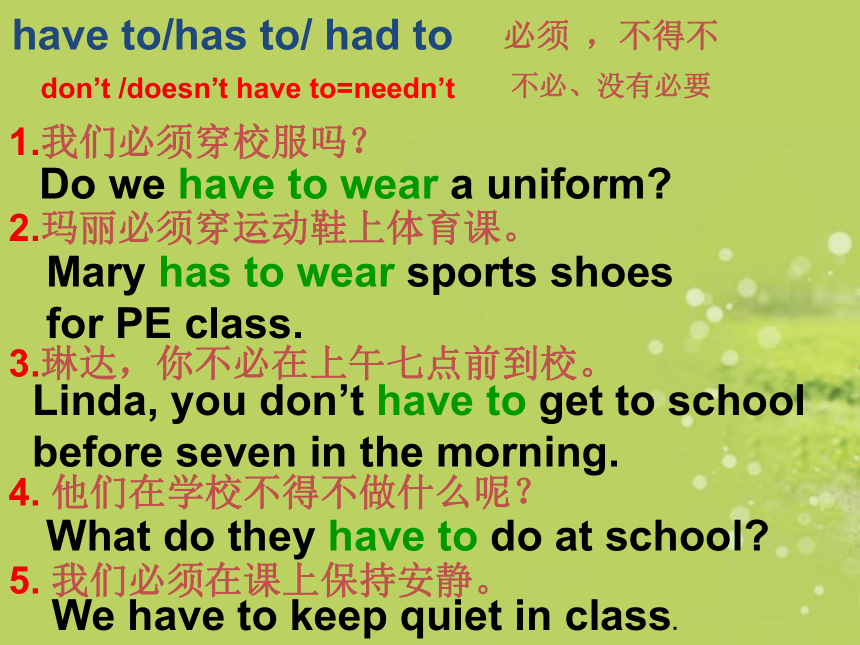

文档简介
(共31张PPT)
1、 arrive “到达” 。
Don’t arrive late for school. 不要上学迟到。
arrive是一个不及物动词,不能直接跟表示地点的名词。如果要跟名词,就必须加介词in或at。在大地方前加in(国家、城市等),在小地方前加at(家、学校、商店等)。
arrive in / at + 地点 get to +地点
reach +地点 (到达某地 )
They arrived in Beijing at six. 他们六点钟到的北京。
We usually arrive at the village in the morning. 我们通常在早上到那个小村庄。
1) listen 听;用来提醒某人注意,后面不跟事物。
Listen! Who’s singing in the classroom
听!谁在教室里唱歌?
2) 如果后面跟要听的事物,应跟介词to再跟事物。
Listen to our teacher carefully.认真听老师讲。
3. fight 打架,争吵
1) 作动词用
Jack never fights with his brother.杰克从不和他的弟弟打架。
2) 作名词,意为“打架;争吵”; 常用词组have a fight“打架;吵架”
Did you have a fight with her 你和她吵过架吗?
2. listen 的用法;
4. wear 意为“穿、戴”
My aunt wears a blue skirt and a white T-shirt. 我姑姑穿着蓝色的裙子,白色的T恤。
Does he wear glasses 他戴眼镜吗?
5. —What are the rules 规则是什么?
—Well, we can’t arrive late for class.
哦, 我们上课不能迟到。
1) rule“规则”, 可数名词, 构成的短语有:
obey the rules 遵守规章
be against the rules
break the rules
6. What else do you have to do
else “其他的”, 用来修饰something, anything,
nothing等,还可用来修饰疑问词 what, where,
who等, else修饰疑问词或不定代词时应后置。
如:
Do you have anything else to do?
Who else did you see
7. 情态动词have to 的用法
have to意思是“必须,不得不”,侧重于客观上的必要
和外界的权威。
结构: 主语+have to+动词原形+其他(一般现在时,
主语是第三人称单数时, 用has to;
如:
We have to wear sneakers for gym class.
在体育课上, 我们必须穿运动鞋。
Tom has to practice the guitar every day.
汤姆每天必须练习弹吉他。
I had to get up at 5:00 am last Monday.
上周一, 我不得不早上5点起床。
2) 否定形式: 主语+don’t have to+动词原形+其他(一般现在时,
主语是第三人称单数时, 用doesn’t have to;
Nick doesn’t have to wear a uniform.尼克不必穿制服。
We didn’t have to do our homework at once.
我们不必马上完成作业。
3) 疑问句: Do(Does)+主语+have to +动词原形+其他
如:
—Do you have to stay at home on weekends
周末你必须待在家里吗?
—Yes, I do. / No, I don't. 是的,我必须。/ 不, 我不必。
8. have to与must
1) have to意为“必须做某事”强调“客观需要”
They have to wear school uniforms every day. 他们每天必须穿校服。
2) must 意为“必须”强调主观上的愿望
It’s late. I must go home now.天晚了。现在我必须要回家。
1. It’s cold outside. We ______ stay at home.
2. We ____ be good with our parents.
We have to wear
a uniform at school.
We have to clean the
Classroom every day.
What else do you have to do
Let’s look at Mary’s Monday at school.
There’s a gym class today. I have to wear_____________ .
sports shoes
But there’s a party at school today, so I don’t have to wear ______________.
uniform
After school, I have to clean the _________ .
classroom
have to/has to/ had to
don’t /doesn’t have to=needn’t
必须 ,不得不
不必、没有必要
1.我们必须穿校服吗?
2.玛丽必须穿运动鞋上体育课。
3.琳达,你不必在上午七点前到校。
4. 他们在学校不得不做什么呢?
5. 我们必须在课上保持安静。
Do we have to wear a uniform
Mary has to wear sports shoes
for PE class.
Linda, you don’t have to get to school
before seven in the morning.
What do they have to do at school
We have to keep quiet in class.
用have to或has to填空。
1.We ________ clean our classroom after school.
2.She _________ make her bed after getting up.
3.It’s late. Mr Beckman ______ go to work by car.
4.Emily and Peter join a music club. They _______ practice the guitar every day.
have to
have to
has to
has to
根据句意,用can和can’t填空。
1. Mr Green_______ smoke here because there’s a sign on the wall. It says “No smoking.”
2. It’s very hot outside. You______ wear a hat.
3. We _______ eat in the classroom because it’s impolite to teachers.
4. I ______ go to bed after 11:00 on school night.
5. The students _____ read books and magazines in the library.
can’t
can
can’t
can
can’t
1. Is John new at school ___________
2. Are there many rules at school
______________
2d Read the conversation in 2d and answer the questions.
Yes, he is.
Yes, there are.
3. Can he bright music players to school
_______________
4. Do they have to always wear the school uniform _______________
No, he can’t.
Yes, they do.
2d Role-play the conversation.
1. 不要在楼道里跑。 __________________
2. 不要打架。 _________________
3. 有什么规则? _________________
4. 我们必须按时上课. __________________
5. 我们可以在教室里吃东西吗?
_____________
6. 不能。但我们可以在餐厅里吃东西。
________________________________
7. 我们可以在上课的时候带帽子吗?
___________________________
阅读Grammar Focus部分,完成下列句子。
Don’t fight.
Don’t run in the hallways.
What are the rules
We must be on time for class.
Can we eat in the classroom
No, we can’t, but we can eat in the dining hall.
Can we wear a hat in class
8. 他在学校里必须穿校服吗?
__________________________________
9. 是的,必须。/ 不,不必。
_______________________________
10. 你们必须做什么?
_______________________________
11. 在图书馆里我们必须保持安静。
_________________________________
Yes, he does. / No, he doesn’t.
Does he have to wear a uniform at school
What do you have to do
We have to be quiet in the library.
肯定的祈使句:
Come in, please! 请进!
Sit down, please. 请坐。
Let's go home. 我们回家吧。
否定的祈使句是在动词前(即句首)加Don’t.
Don’t talk in class! 不要在课堂上讲话!
Don’t open the window! 别开窗!
Don’t be late for school! 上学别迟到
一、祈使句
用法:一般以动词原形开头,表示请 求、命令、劝说、警告等。在祈使句中,通常省略句子主语第二人称you。
2. 句子结构
(1) 肯定句:__________+ 其他
在餐厅里吃东西。
________________________________
在音乐教室里听音乐。
________________________________
骑自行车去上学。
_________________________________
动词原形
Eat in the dining hall.
Listen to music in the music room.
Ride the bike to school.
(2) 否定句: _____ + _________ + 其他
不要和同学们打架。
_______________________________
不要在教室里打篮球。
________________________________
Don’t fight with your classmates.
Don’t play basketball in the classroom.
Don’ t 动词原形
以let引起的句子 ____+ sb.+动词原形
让我们步行去上学吧。 _________________
(4) No + 动词-ing形式。表示“禁止、规劝”
禁止停车!No Parking. 禁止吸烟!No Smoking.
Let
Let’s walk to school.
二、询问和讨论学校规则:
1. ━有什么规则?━我们必须保持安静。
__________________
2. ━我们可以在上课的时候戴帽子吗?
________________________________
━不可以。你可以在外面戴帽子。
___________ ______________________
3. ━你必须做什么事? __________
━我们必须穿校服。
________________________________
4. 他必须在校吃午饭吗?
__________________________________
What are the rules
We must be quiet.
Can we wear a hat in class
No, we can’t. You can wear a hat outside.
What do you have to do
We must wear the school uniforms.
Does he have to eat lunch at school
Library Rules
Don’t talk.
__________________
__________________
__________________
3a Write the rules for the
school library.
Don’t listen to music.
Don’t eat or drink.
Don’t take photos.
方法指导:
1. 由图示可知都是一些禁止类的祈使句。
2. 可知应用“Don’t + 动词原形”句子。
3b Use the words to make questions about the rules. Then write answers according to your school.
1. 根据例句,可知要求我们造一般疑问句并根据实际情况进行回答。
2. 先确定句子的主语。
3. 再确定用情态动词还是用助动词来构成疑问语序。
4. 根据实际情况做出肯定或否定回答,答语的主语要与问句保持一致。
2. Eat (he/have to/in the dinning hall)
Q: __________________________
A: __________________________
Listen to music (we/can/in the hallways)
Q: __________________________
A: __________________________
4. Wear a hat (we/can/in the classroom)
Q: ________________________
A: ________________________
2. Eat (he/have to/in the dining hall)
Q: ________________________________
A: _____________
3. Listen to music (we/can/in the hallways)
Q: ________________________________
A: _____________
4. Wear a hat (we/can/in the classroom)
Q: _____________________________
A: ____________
Then answer the questions.
Yes, he does.
Does he have to eat in the dining hall
Can we listen to music in the hallways
No, we can’t.
Can we wear a hat in the classroom
No, we can’t.
At my dream school, we don’t have to come to school every day. …
We can eat in class. …
3c Make up five cool rules for your dream school. Share your rules with the class. Your classmates vote for the Coolest School!
We don’t have to wear school uniforms. …
We can listen to music in class. …
At my dream school, we don’t have to come to school every day. We can eat in the classroom.
We can listen to music in class.
We don’t have to do homework.
We don’t have to wear school uniforms at school.
Great! Jim’s school is the coolest.
1. He has to eat breakfast quickly. (改为一般疑问句)
__________________________________
2. Play volleyball after class. (改为否定句)
________________________________
句型转换
Does he have to eat breakfast quickly
Don’t play volleyball after class.
3. We can wear sports shoes in class. (改为一般疑问) ______________________________
4. Don’t arrive late for class. (改为同义句)
_______________________________
5. Eric has to do his homework before six. (对划线部分提问)
___________________________________
Can we wear sports shoes in class
We must be on time for class.
What does Eric have to do before six
1. Remember the sentences in the
Grammar Focus.
2. Write five rules in your family.
1、 arrive “到达” 。
Don’t arrive late for school. 不要上学迟到。
arrive是一个不及物动词,不能直接跟表示地点的名词。如果要跟名词,就必须加介词in或at。在大地方前加in(国家、城市等),在小地方前加at(家、学校、商店等)。
arrive in / at + 地点 get to +地点
reach +地点 (到达某地 )
They arrived in Beijing at six. 他们六点钟到的北京。
We usually arrive at the village in the morning. 我们通常在早上到那个小村庄。
1) listen 听;用来提醒某人注意,后面不跟事物。
Listen! Who’s singing in the classroom
听!谁在教室里唱歌?
2) 如果后面跟要听的事物,应跟介词to再跟事物。
Listen to our teacher carefully.认真听老师讲。
3. fight 打架,争吵
1) 作动词用
Jack never fights with his brother.杰克从不和他的弟弟打架。
2) 作名词,意为“打架;争吵”; 常用词组have a fight“打架;吵架”
Did you have a fight with her 你和她吵过架吗?
2. listen 的用法;
4. wear 意为“穿、戴”
My aunt wears a blue skirt and a white T-shirt. 我姑姑穿着蓝色的裙子,白色的T恤。
Does he wear glasses 他戴眼镜吗?
5. —What are the rules 规则是什么?
—Well, we can’t arrive late for class.
哦, 我们上课不能迟到。
1) rule“规则”, 可数名词, 构成的短语有:
obey the rules 遵守规章
be against the rules
break the rules
6. What else do you have to do
else “其他的”, 用来修饰something, anything,
nothing等,还可用来修饰疑问词 what, where,
who等, else修饰疑问词或不定代词时应后置。
如:
Do you have anything else to do?
Who else did you see
7. 情态动词have to 的用法
have to意思是“必须,不得不”,侧重于客观上的必要
和外界的权威。
结构: 主语+have to+动词原形+其他(一般现在时,
主语是第三人称单数时, 用has to;
如:
We have to wear sneakers for gym class.
在体育课上, 我们必须穿运动鞋。
Tom has to practice the guitar every day.
汤姆每天必须练习弹吉他。
I had to get up at 5:00 am last Monday.
上周一, 我不得不早上5点起床。
2) 否定形式: 主语+don’t have to+动词原形+其他(一般现在时,
主语是第三人称单数时, 用doesn’t have to;
Nick doesn’t have to wear a uniform.尼克不必穿制服。
We didn’t have to do our homework at once.
我们不必马上完成作业。
3) 疑问句: Do(Does)+主语+have to +动词原形+其他
如:
—Do you have to stay at home on weekends
周末你必须待在家里吗?
—Yes, I do. / No, I don't. 是的,我必须。/ 不, 我不必。
8. have to与must
1) have to意为“必须做某事”强调“客观需要”
They have to wear school uniforms every day. 他们每天必须穿校服。
2) must 意为“必须”强调主观上的愿望
It’s late. I must go home now.天晚了。现在我必须要回家。
1. It’s cold outside. We ______ stay at home.
2. We ____ be good with our parents.
We have to wear
a uniform at school.
We have to clean the
Classroom every day.
What else do you have to do
Let’s look at Mary’s Monday at school.
There’s a gym class today. I have to wear_____________ .
sports shoes
But there’s a party at school today, so I don’t have to wear ______________.
uniform
After school, I have to clean the _________ .
classroom
have to/has to/ had to
don’t /doesn’t have to=needn’t
必须 ,不得不
不必、没有必要
1.我们必须穿校服吗?
2.玛丽必须穿运动鞋上体育课。
3.琳达,你不必在上午七点前到校。
4. 他们在学校不得不做什么呢?
5. 我们必须在课上保持安静。
Do we have to wear a uniform
Mary has to wear sports shoes
for PE class.
Linda, you don’t have to get to school
before seven in the morning.
What do they have to do at school
We have to keep quiet in class.
用have to或has to填空。
1.We ________ clean our classroom after school.
2.She _________ make her bed after getting up.
3.It’s late. Mr Beckman ______ go to work by car.
4.Emily and Peter join a music club. They _______ practice the guitar every day.
have to
have to
has to
has to
根据句意,用can和can’t填空。
1. Mr Green_______ smoke here because there’s a sign on the wall. It says “No smoking.”
2. It’s very hot outside. You______ wear a hat.
3. We _______ eat in the classroom because it’s impolite to teachers.
4. I ______ go to bed after 11:00 on school night.
5. The students _____ read books and magazines in the library.
can’t
can
can’t
can
can’t
1. Is John new at school ___________
2. Are there many rules at school
______________
2d Read the conversation in 2d and answer the questions.
Yes, he is.
Yes, there are.
3. Can he bright music players to school
_______________
4. Do they have to always wear the school uniform _______________
No, he can’t.
Yes, they do.
2d Role-play the conversation.
1. 不要在楼道里跑。 __________________
2. 不要打架。 _________________
3. 有什么规则? _________________
4. 我们必须按时上课. __________________
5. 我们可以在教室里吃东西吗?
_____________
6. 不能。但我们可以在餐厅里吃东西。
________________________________
7. 我们可以在上课的时候带帽子吗?
___________________________
阅读Grammar Focus部分,完成下列句子。
Don’t fight.
Don’t run in the hallways.
What are the rules
We must be on time for class.
Can we eat in the classroom
No, we can’t, but we can eat in the dining hall.
Can we wear a hat in class
8. 他在学校里必须穿校服吗?
__________________________________
9. 是的,必须。/ 不,不必。
_______________________________
10. 你们必须做什么?
_______________________________
11. 在图书馆里我们必须保持安静。
_________________________________
Yes, he does. / No, he doesn’t.
Does he have to wear a uniform at school
What do you have to do
We have to be quiet in the library.
肯定的祈使句:
Come in, please! 请进!
Sit down, please. 请坐。
Let's go home. 我们回家吧。
否定的祈使句是在动词前(即句首)加Don’t.
Don’t talk in class! 不要在课堂上讲话!
Don’t open the window! 别开窗!
Don’t be late for school! 上学别迟到
一、祈使句
用法:一般以动词原形开头,表示请 求、命令、劝说、警告等。在祈使句中,通常省略句子主语第二人称you。
2. 句子结构
(1) 肯定句:__________+ 其他
在餐厅里吃东西。
________________________________
在音乐教室里听音乐。
________________________________
骑自行车去上学。
_________________________________
动词原形
Eat in the dining hall.
Listen to music in the music room.
Ride the bike to school.
(2) 否定句: _____ + _________ + 其他
不要和同学们打架。
_______________________________
不要在教室里打篮球。
________________________________
Don’t fight with your classmates.
Don’t play basketball in the classroom.
Don’ t 动词原形
以let引起的句子 ____+ sb.+动词原形
让我们步行去上学吧。 _________________
(4) No + 动词-ing形式。表示“禁止、规劝”
禁止停车!No Parking. 禁止吸烟!No Smoking.
Let
Let’s walk to school.
二、询问和讨论学校规则:
1. ━有什么规则?━我们必须保持安静。
__________________
2. ━我们可以在上课的时候戴帽子吗?
________________________________
━不可以。你可以在外面戴帽子。
___________ ______________________
3. ━你必须做什么事? __________
━我们必须穿校服。
________________________________
4. 他必须在校吃午饭吗?
__________________________________
What are the rules
We must be quiet.
Can we wear a hat in class
No, we can’t. You can wear a hat outside.
What do you have to do
We must wear the school uniforms.
Does he have to eat lunch at school
Library Rules
Don’t talk.
__________________
__________________
__________________
3a Write the rules for the
school library.
Don’t listen to music.
Don’t eat or drink.
Don’t take photos.
方法指导:
1. 由图示可知都是一些禁止类的祈使句。
2. 可知应用“Don’t + 动词原形”句子。
3b Use the words to make questions about the rules. Then write answers according to your school.
1. 根据例句,可知要求我们造一般疑问句并根据实际情况进行回答。
2. 先确定句子的主语。
3. 再确定用情态动词还是用助动词来构成疑问语序。
4. 根据实际情况做出肯定或否定回答,答语的主语要与问句保持一致。
2. Eat (he/have to/in the dinning hall)
Q: __________________________
A: __________________________
Listen to music (we/can/in the hallways)
Q: __________________________
A: __________________________
4. Wear a hat (we/can/in the classroom)
Q: ________________________
A: ________________________
2. Eat (he/have to/in the dining hall)
Q: ________________________________
A: _____________
3. Listen to music (we/can/in the hallways)
Q: ________________________________
A: _____________
4. Wear a hat (we/can/in the classroom)
Q: _____________________________
A: ____________
Then answer the questions.
Yes, he does.
Does he have to eat in the dining hall
Can we listen to music in the hallways
No, we can’t.
Can we wear a hat in the classroom
No, we can’t.
At my dream school, we don’t have to come to school every day. …
We can eat in class. …
3c Make up five cool rules for your dream school. Share your rules with the class. Your classmates vote for the Coolest School!
We don’t have to wear school uniforms. …
We can listen to music in class. …
At my dream school, we don’t have to come to school every day. We can eat in the classroom.
We can listen to music in class.
We don’t have to do homework.
We don’t have to wear school uniforms at school.
Great! Jim’s school is the coolest.
1. He has to eat breakfast quickly. (改为一般疑问句)
__________________________________
2. Play volleyball after class. (改为否定句)
________________________________
句型转换
Does he have to eat breakfast quickly
Don’t play volleyball after class.
3. We can wear sports shoes in class. (改为一般疑问) ______________________________
4. Don’t arrive late for class. (改为同义句)
_______________________________
5. Eric has to do his homework before six. (对划线部分提问)
___________________________________
Can we wear sports shoes in class
We must be on time for class.
What does Eric have to do before six
1. Remember the sentences in the
Grammar Focus.
2. Write five rules in your family.
同课章节目录
- Unit 1 Can you play the guitar?
- Section A
- Section B
- Unit 2 What time do you go to school?
- Section A
- Section B
- Unit 3 How do you get to school?
- Section A
- Section B
- Unit 4 Don't eat in class.
- Section A
- Section B
- Unit 5 Why do you like pandas?
- Section A
- Section B
- Unit 6 I'm watching TV.
- Section A
- Section B
- Review of Units 1-6
- Unit 7 It's raining!
- Section A
- Section B
- Unit 8 Is there a post office near here?
- Section A
- Section B
- Unit 9 What does he look like?
- Section A
- Section B
- Unit 10 I'd like some noodles.
- Section A
- Section B
- Unit 11 How was your school trip?
- Section A
- Section B
- Unit 12 What did you do last weekend?
- Section A
- Section B
